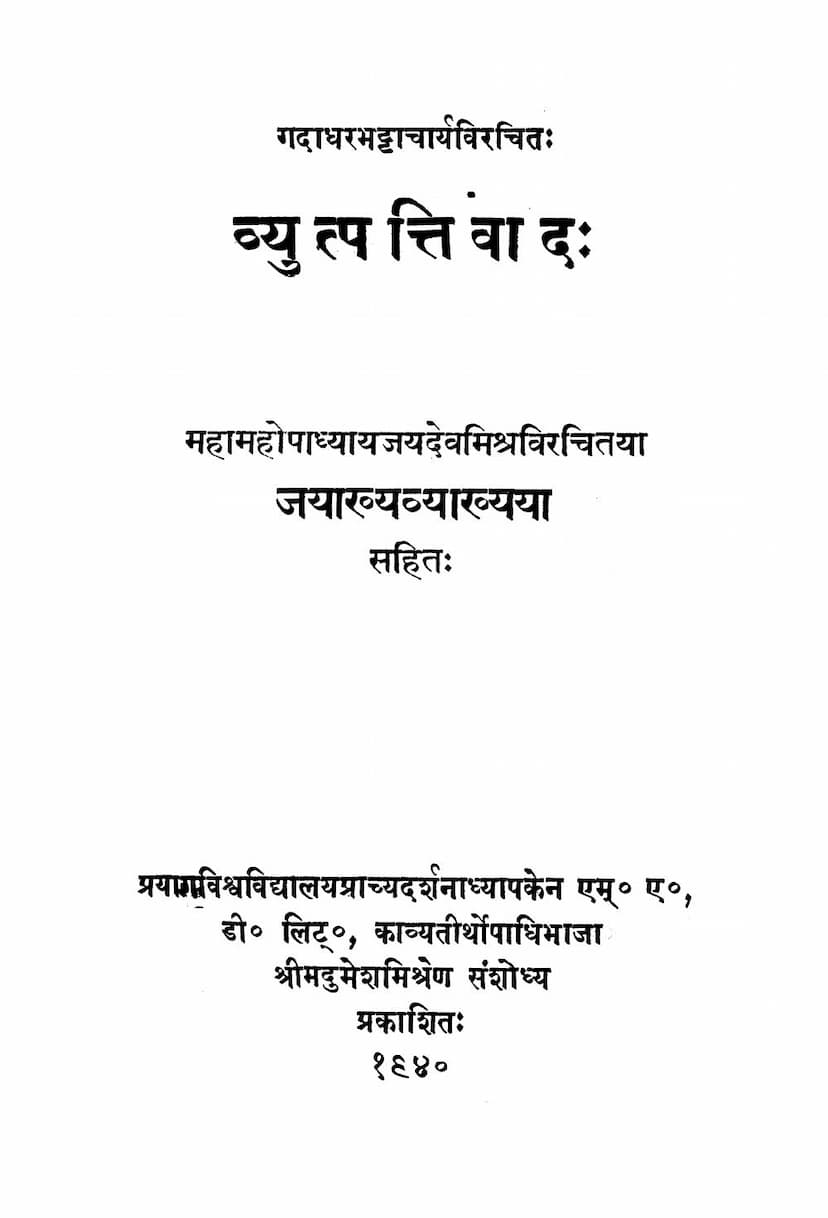Vyutpattivada Jayakhyavyakhyaya
Added to library: September 2, 2025

Summary
The provided text is an extensive scholarly work on the Vyutpattivada, a philosophical treatise on grammar and linguistics by Gadadhara Bhattacharya, accompanied by a commentary called Jayakhyavyakhya by Jayadeva Misra. The text is published by Prayag Vishwa Vidyalaya and was edited and published by Dr. Umesha Mishra.
Here's a breakdown of the content based on the provided pages:
Title and Authorship:
- Title: Vyutpattivada Jayakhyavyakhya
- Author of the main text: Gadadhara Bhattacharya
- Author of the commentary (Vyakhya): Jayadeva Misra
- Editor and Publisher: Dr. Umesha Mishra (M.A., D. Litt., Kavyatirtha), Professor of Indian Philosophy, University of Allahabad.
- Publication Details: First edition 1927, Second edition 1940. Printed by J. K. Sharma at Allahabad Law Journal Press.
Content Summary (Based on the provided text, particularly the introductions and the beginning of the main text):
-
Context and Importance:
- The text is situated within the framework of Indian logic (Nyaya) and philosophy, referencing the Nyayasutras and Ganggaresh Upadhyaya's "Tattvachintamani."
- The "Vyutpattivada" is presented as a crucial work within the "Shabda Khanda" (section on verbal testimony/words) of the philosophical tradition. This section is significant as it deals with the theories of not only Nyaya philosophers but also Mimamsakas and grammarians regarding the nature of words.
- The author, Gadadhara Bhattacharya, focused on the "Prakrityartha" (meaning of the root/base) in his "Shakti Vada" (theory of meaning).
- The "Vyutpattivada" itself is highlighted as a seminal work that primarily follows the Nyaya school's perspective, focusing on the "Pratyayartha" (meaning of affixes/suffixes) and is highly regarded for its clarity and depth.
- The text is considered essential for achieving mastery in grammar and logic, indicating its profound influence and complexity.
-
The Commentary (Jayakhyavyakhya):
- Due to the profound and intricate nature of the "Vyutpattivada," the need for a clear and accessible commentary was recognized.
- Mahamahopadhyaya Jayadeva Sharma of Mithila composed the "Jaya" commentary, praised for its simplicity and clarity, making the complex work more approachable for students.
- The preface notes the unfortunate demise of the commentator, Jayadeva Misra, during the composition of the first commentary. However, his work was continued by compiling notes from his other writings to complete the text up to a certain point. The current edition includes the remaining portion of the text along with the complete commentary ("Jaya") for the preservation and dissemination of this significant philosophical discourse.
-
Biographical Information (Gadadhara Bhattacharya):
- Gadadhara Bhattacharya was the son of Jiyacharya and hailed from Bengal, born in a Varendra Brahmin family in a place called Pakshmapashana.
- He moved to Navadwipa to study Nyaya under the renowned logician Harirama Tarkavagisha.
- Tarkavagisha passed away shortly after Gadadhara began his studies. Gadadhara succeeded him as a teacher but initially faced a lack of students due to doubts about his credentials and erudition.
- Undeterred, Gadadhara devised a plan to showcase his scholarship. He moved his residence near the highway and engaged in deep philosophical discussions in the open, attracting students and scholars who overheard him.
- His profound knowledge soon became widely recognized, establishing his reputation as a prominent pandit.
- Gadadhara Bhattacharya authored several important works, including commentaries on Nyayakusumamanjali, Tattwachintamani, Atmattattvaviveka, etc., and several treatises on specific philosophical arguments (Vada), such as "Shakti Vada," "Vyutpatti Vada," "Karanaata Vada," etc. His commentaries are famously known as "Gadadhari."
- Jayarama was his principal disciple and the commentator on "Shakti Vada."
- Gadadhara Bhattacharya's approximate period of prominence is cited as around 1650 CE.
-
Biographical Information (Jayadeva Mishra):
- Mahamahopadhyaya Jayadeva Mishra was born in a respected Maithil Brahmin family in the village of Gajhada in Mithila.
- He studied grammar under the famous scholar Haladhara Sharma and later refined his knowledge of grammar and other Shastras under renowned scholars like Balashastri and Shivakumara Mishra in Kashi.
- He held professorial positions at Darbhanga Pathashala and later became the Head of the Department of Oriental Studies at Hindu University (Banaras Hindu University).
- He taught various Shastras for approximately forty-six years and guided numerous students.
- He was honored with the title of Mahamahopadhyaya by the Emperor of India in 1616 CE.
- His notable works include a commentary on Paribhashendushekhara, Shastrartha Ratnavali, and the commentary "Jaya" on Vyutpattivada.
- Jayadeva Mishra passed away in Kashi in 1982 Vikram Samvat (around 1925 CE) on the seventh day of the seventh lunar fortnight of Phalguna. His passing was mourned by the scholarly community. He was noted for his dedication to scholarship even in his final moments, working on his commentary on Vyutpattivada.
-
Beginning of the Vyutpattivada:
- The text starts with an invocation to Lord Ganesha and then proceeds to define the subject matter.
- The initial discussions seem to revolve around the concept of "Shabdabodha" (verbal cognition) and the role of "Samsarga" (relation) between words and their meanings.
- The text begins to analyze the relationship between words and the cognition they produce, focusing on how the meaning of one word relates to the meaning of another within a sentence. It touches upon concepts like "Padartha" (word-meaning), "Samsarga Maryada" (principle of relation), "Upasthiti" (mental representation), "Vritti" (semantic relation), "Shakti" (lexical meaning), and "Akanksha" (syntactic expectancy).
- The initial paragraphs seem to be engaged in a debate with other philosophical schools (like the Naiyayikas and Mimamsakas) regarding the source and nature of semantic relations and the conditions for valid verbal cognition.
In essence, the provided text is the introductory and initial part of a critical edition of a significant work in Indian philosophy and linguistics, focusing on the theory of meaning in language, with detailed biographical information about the renowned scholars involved. The "Vyutpattivada" itself delves into the grammatical and semantic principles that govern how words convey meaning and form coherent thoughts.